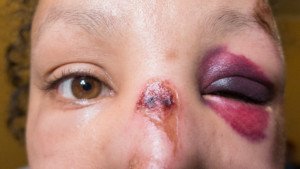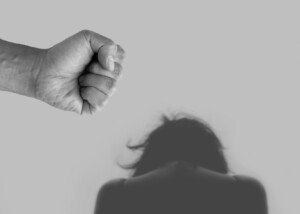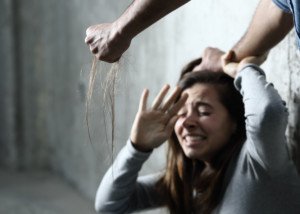
When it comes to domestic violence (staying with abusive men), do abused women share common psychological traits?
The myth circulates that “any” woman can be a victim of domestic violence.
However, though almost “any” women can end up getting hit on a first date, to say that any women can STAY with an abusive man is a whole new ballgame.
Only some women are capable of staying with abusive men.
People who insist that any women can be a victim of domestic violence, i.e., staying with the abusive man despite repeated beatings, may believe that abused women don’t share any specific psychological traits, since domestic abuse supposedly can happen to any woman.
The irony is that nobody seems to disagree with the assertion that abusive men share common psychological traits.

Shutterstock/Lolostock
Now, since abusive men share common emotional traits, doesn’t it stand to reason that women who stay with abusive men, likewise, not only share common thought processes with each other, but actually have specific psychological traits?
These traits complement the traits of the abusive man. Think of it as two pieces of a puzzle interlocking perfectly.
Otherwise, how is it that abusive men can share common psychological traits, but the abused women don’t?
The root common denominator among women who stay with abusive men is low self-esteem, though not every woman with poor self-esteem would stay with an abusive man.
Some will terminate the relationship early on, like movie star Marilyn Monroe did with Joe DiMaggio, after he struck her only a few times. Women can be very successful in their profession, yet still suffer low self-esteem.
“It has everything to do with low self-esteem,” says Mary Jo Fay, RN, MSN, author of When Your Perfect Partner Goes Perfectly Wrong.
“Low self-esteem women (or men) believe that there is something wrong with them … that they don’t deserve to be treated well; they aren’t worthy of good love.”
Such self-depreciation is learned early on, says Fay.
“Odds are these women had at least one parent who was an abuser (physical, emotional, verbal, and/or sexual) and one parent who was the co-dependent who just accepted the spouse’s behavior as normal — probably because they themselves were raised in just such an environment.
“Sadly, this crazy pattern can just get passed down from generation to generation.
“Frequently if there is more than one child in the household, one will grow up to become an abuser and one a co-dependent.”
Issues that seem to be offshoots of low self-esteem are also at work, such as too much desire to be taken care of.
Of course, who doesn’t, to some degree, wish to be taken care of? Even most decent men want to be taken care of — by “a good woman.”
But the need to be taken care of can go overboard in some women, “…a desire to be taken care of, rather than be equal partners — wanting to be a little girl —
“Yes, many women who remain in abusive situations grew up in families where the common cycle of abuse/romance was demonstrated by parents, or with a very controlling (although not abusive) father,” says Tina B. Tessina, PhD, psychotherapist who counsels couples and individuals, and author of Money, Sex and Kids: Stop Fighting about the Three Things That Can Ruin Your Marriage.
“These women were not encouraged to stand up for themselves, or to think for themselves.
“The other scenario is an absent father, leading them to dream of a father who would take care of them.
“They’re often more afraid of life in the real world, alone, than they are of the abuse.
“Once these women have children, the fear that they won’t be able to take care of the children alone adds to their paralysis.”
Another risk factor is when the woman is too much of a caretaker — women who seek approval by pleasing others. “Hurt-people, hurt people,” says Fay.
“And too many women look at their abusive mate’s life story of being deeply wounded by their family of origin. They feel sorry for him. They want to heal him or ‘fix’ him.”
Some abused women believe they can change their men.
“But they don’t understand that abuse begets abuse,” continues Fay.
“And unless this wounded man gets lengthy and in-depth professional help, there is little or nothing the victim can do to fix the situation.
“And the abuse will only continue, generally getting worse, not better.
“Unless the individual does some serious psychological work, the pattern can be very difficult to break.
“So oftentimes, even if they (women) do leave, they are likely to attract the same kind of man the next time, and again won’t recognize the abuse at the beginning, thus getting sucked into it once again.”
 Dr. Tessina appears frequently on radio, TV, video and podcasts, and has been in private practice for over 30 years.
Dr. Tessina appears frequently on radio, TV, video and podcasts, and has been in private practice for over 30 years.
 Mary Jo Fay is a speaker, author and consultant who specializes in relationships.
Mary Jo Fay is a speaker, author and consultant who specializes in relationships.
 Lorra Garrick has been covering medical, fitness and cybersecurity topics for many years, having written thousands of articles for print magazines and websites, including as a ghostwriter. She’s also a former ACE-certified personal trainer.
Lorra Garrick has been covering medical, fitness and cybersecurity topics for many years, having written thousands of articles for print magazines and websites, including as a ghostwriter. She’s also a former ACE-certified personal trainer.
.


























